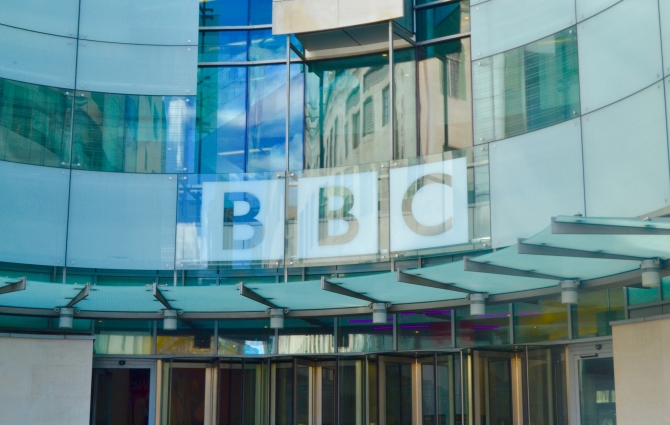 Professor Charlie Beckett, director of Polis, the LSE’s international journalism think-tank, and a former BBC journalist, argues that instead of pushing for BBC cuts, the government should invest in the public broadcaster and encourage structural reforms that would benefit both the institution and its audiences. To hear more about the future of the BBC, register for our LSE public event on 2 March, where BBC Director General Tim Davie will speak about ‘Public Service Broadcasting in its Second Century.’
Professor Charlie Beckett, director of Polis, the LSE’s international journalism think-tank, and a former BBC journalist, argues that instead of pushing for BBC cuts, the government should invest in the public broadcaster and encourage structural reforms that would benefit both the institution and its audiences. To hear more about the future of the BBC, register for our LSE public event on 2 March, where BBC Director General Tim Davie will speak about ‘Public Service Broadcasting in its Second Century.’
Politics moves fast these days and things can get broken. It now seems an age since Nadine Dorries took to Twitter to distract from the earlier iterations of the Downing Street lockdown parties furore by announcing both a freeze and an end-date for the BBC licence fee. Within hours the two-year freeze was confirmed, but the DCMS Secretary of State walked back from her death-knell for the licence fee to the less exciting pre-existing position that it is under review in 2027.
Since then, a lot of people have made some core points in defence of the BBC and the licence fee. The pandemic has shown the remarkable public confidence in the BBC and its unique convening and informational role in UK society. And it is still remarkable value for money when you consider the amount of service created per pound of funding. In a world of extreme speech and so-called ‘fake news,’ as well as increasing commercial pressure on access to information and culture, the BBC is the kind of national asset that many other people envy and realise would be almost impossible to create from scratch. Netflix or Amazon Prime are simply not directly comparable. So, don’t dismantle it, goes the argument, until you have a real plan for its reform or replacement and a genuine policy logic to drive forward the debate.
For me, the minority of people in the Conservative Party who want to radically change BBC funding and purpose are somewhat hobbled in their argument by ideological bias or instinct. They (like people of other political partisan persuasions) resent that the BBC does not always endorse their world-view. They believe that the free-market is always preferable to collective or public provision. The more technologically-aware also realise that the way media is produced and consumed is changing dramatically, so surely the BBC should be more like the new disruptive providers?
Soft Power
In fact, I think there is a powerful argument to be made to strengthen the BBC to help bolster a post-Brexit, pro-market argument in line with this government’s declared policy agenda. Internationally, as the UK loses its seat at various diplomatic tables, the propaganda value of the BBC’s international services provides extraordinary cheap soft power. To be sure, the BBC World Service is not a Brexit PR machine, but its influence in connecting the world is vital to the UK’s international reputation and profile.
Levelling Up
Domestically, surely, the BBC could be a central part of any attempt to drive a genuine ‘levelling up’ agenda that seeks to connect all parts of the UK to the benefits of innovation, education and information? This is partly about BBC investment in creative industries outside of London, but also by acting as a platform or incubator for other media and creative industries and a conduit for creating great social capital around the nations.
To do this and to do it well, the BBC needs sustainable and relatively predictable funding. A series of inquiries and reviews have shown that the licence fee is the worst possible form of financing for the BBC – except for all the other forms that have been suggested. Surely the last thing that the commercial media sector needs is the BBC competing for subscriptions or advertising? Is there a government brave enough to bring in a new tax such as household levy to replace the licence fee? In reality, I am sure any change in BBC funding will be incremental and piece-meal, and that might be a good way forward.
Structural changes are the key
There are all sorts of possibilities for reform within the BBC. Clearly it needs to respond to the crisis in attention from younger demographics. And it needs to make tough, brave, creative decisions about what NOT to do, as well as what it does. Yes, that means horrid choices. Personally, I would start by closing the 24-hour BBC News Channel, BBC Four and the Archers (OK, the last one is a personal foible…). I would try to learn the lessons from recent successes such as Ros Atkins’ online viral ‘explainer’ news videos, Sophia Smith-Galer’s TikTok following (now at Vice), and some of the podcasts. And that is just BBC journalism.
The key to the future though will not just be which channel gets dropped. Not even Gary Lineker’s salary. It will be structural. Internally, what future for BBC Studios as a major production centre? Externally, are there new partnerships around services, such as BritBox, that might involve new forms of financial arrangements? A BBC that can borrow on the markets and partner with major tech or other media players could build hybrid revenue sources that complement some form of licence fee and don’t offer a threat to the private sector. Isn’t that an agenda that a truly radical and innovative Secretary of State for Media – or BBC Director General – should start to explore?
Charlie Beckett worked at the BBC from 1989-1999 and was an advisor to the Commons Media Select Committee during the last BBC Charter Renewal process. This article gives the views of the author and does not represent the position of the Media@LSE blog, nor of the London School of Economics and Political Science.





